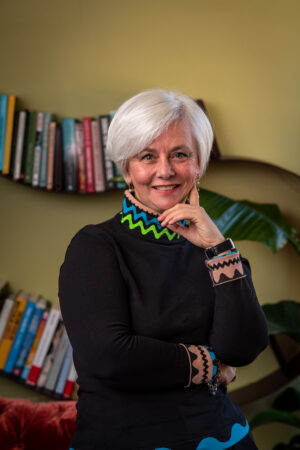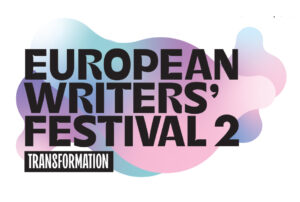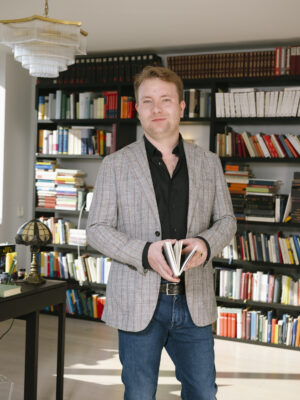An overview of the eight debut fiction titles in our most recent jury selection.
Every spring and autumn we see a fresh crop of debut novels among the high-quality literary submissions New Books in German receives from German-language publishers. In addition to our support for established authors and those aiming to establish themselves internationally, our editorial team and jury are always particularly keen to hear from new voices on the German-language literary scene. NBG has a long history of promoting these literary newcomers and helping stand-out debuts to find their way into English. Autumn 2023 is no exception, and we take great pleasure in introducing you to our eight debut titles this season, all with guaranteed English translation funding.
These eight titles reflect the variety and depth of talent in contemporary German-language literature. With four novels from Germany, three from Switzerland, and one from Austria, including two titles by male authors and six by female authors, these diverse books explore topics ranging from grief, to Stasi surveillance, to the gay scene in Munich in the 1980s. We guarantee you will find something to tempt you!
Lion Christ
Sly Dog (Sauhund), Hanser, 364 pp.
Click here for an English sample translation.
This is a coming-of-age novel set in Munich during the early-mid 1980s. It follows Flori, a young gay man, who runs away from his provincial hometown in Bavaria to the city, and tries to find himself – and the love of his life – in the subculture of Munich’s gay scene. Flori’s struggle to define his identity is played out amid the conflicting expectations of others and complicated friendships and family ties, as the AIDS epidemic gathers pace. Flori is a consummate bastard – the ‘sly dog’ of the book’s title – and yet even as he pushes those closest to him away, and abuses the trust of those around him, the humour and suffering that infuses Christ’s narrative ensures that readers cannot fail to sympathise with Flori’s plight.
Lion Christ was born in Bad Tölz in Bavaria, studied film and literature, and lives in Leipzig.
Book trailer for Sauhund (in German): https://www.youtube.com/watch?v=76Ad0utmH8o
Charlotte Gneuß
Gittersee (Gittersee), S. Fischer, 234 pp.
Click here for an English sample translation.
** Winner of the 2023 Jürgen Ponto Literature Prize **
** Shortlisted for the 2023 ZDF “aspekte” Literature Prize **
** Longlisted for the 2023 German Book Prize **
Set in the former East Germany during the 1970s, Gittersee is a thrilling tale of what happens when the lives of ordinary people become entangled with the machinations of the Stasi. Inspired by her discovery that many Stasi informants were teenagers, Charlotte Gneuß’s protagonist is sixteen-year-old Karin Köhler, who is recruited as a Stasi informant after her boyfriend’s attempt to flee to the West. Gneuß situates a modern female voice – of an impulsive, fearless, and rebellious teen – in the historical past of the GDR in this tense psychological drama. Gittersee is a skilful portrayal of an extraordinary historical period, interweaving dialogue with prose in sparse sentences that convey a society where communication is not working.
Charlotte Gneuß is a graduate of the Leipzig Literature Institute and has recently been awarded the 2023 Jürgen Ponto Literature Prize for Gittersee. She was born in 1992 and her parents grew up in Gittersee in the GDR, an area near Dresden. She is a guest journalist for ZEIT online and also writes drama, is a recipient of the Leonhard Frank scholarship for new drama and the editor of the anthology Glückwunsch (Hanser), an anthology of essays about abortion.
Sarah Elena Müller
Picture Without Girl (Bild ohne Mädchen) Limmat Verlag, 208 pp.
Click here for an English sample translation.
** Nominated for the 2023 Swiss Literature Prize **
** Winner of the 2023 Bern Prize for Literature **
Picture Without Girl follows an unnamed girl in rural Switzerland from the age of around five-years-old to early adulthood. The girls’ parents are self-absorbed and inattentive, leading her to spend increasing amounts of time at their neighbours’ house, where she is allowed to watch as much TV as she likes and, disturbingly, is encouraged to participate in the male neighbour’s own films. The book deals with the subject of child abuse, which is suggested but never actually described. Drawn in from the beginning, the reader is kept in a state of uncertainty wondering if their suspicions are justified. Müller makes skilled use of narrative devices and cinematic techniques, drawing on her own background in multimedia and the visual arts.
Sarah Elena Müller who works with literature, music, virtual reality, audio, and theatre drama through multi-media. She is a member of the Dialect-Pop-Duo Cruise Ship Misery and leads the virtual reality project My Language and me. She is a co-founder of the RAUF Collective of Feminist Swiss writers. She has received many rewards and bursaries.
Interview with Sarah Elena Müller on Bild ohne Mädchen (in German only): https://litradio.net/bild-ohne-maedchen/
Birgit Mattausch
Until We Become Forest (Bis wir Wald warden), Klett-Cotta, 176 pp.
Click here for an English sample translation.
Birgit Mattausch’s beautifully observed poetic debut tells the stories of Nanush and her great-grandmother Babulya, Russian-Germans who were deported to Siberia and then fled to Germany as their own families and many others in their community were forced into labour camps. Events in the novel are framed by an embroidered quilt, first used to carry Nanush to her new home, where she is to have a better life as a ‘German among Germans,’ and later to cover Babulya as she is laid to rest. The family live in a concrete apartment block, and the novel interweaves images from their current life with memories of Russia and questions about what happened there, and the people who stayed. Until W Become Forest is a moving reflection on family, kinship and belonging.
Birgit Mattausch studied German literature and Protestant theology before working for ten years as a pastor in southern Germany. Since 2017 she has worked as a consultant in pastoral training and further education. She worked for several years in a parish with many ethnic German immigrants from the former Soviet Union and lived with them in a high-rise apartment block – she has used this lived experience to inform the writing of her novel.
Anna Neata
Burden (Packerl), Ullstein, 368pp.
Click here for an English sample translation.
Burden is a brilliant, hard-hitting debut – a family novel focusing on women’s experiences during the 20th century and up to the present day. The novel follows the lives of three women in successive generations of one Austrian family: Elli, who is a teenager during the Second World War, her daughter Alexandra, and Alexandra’s daughter, Eva, who is born during the 1980s. The stories of their lives are interwoven as the narrative focus changes, highlighting the parallels between their lives as well as their contrasting experiences of womanhood and motherhood at different historical moments.
Anna Neata was born in Salzburg in 1987 and studied Language Arts at the University of Applied Arts in Vienna. Her play, Oxytocin Baby was awarded the Hans Gratzer Stipend of the Vienna Schauspielhaus and Walkthrough 89 won her the playwright stipend of the Austrian Federal Chancellery.
Necati Öziri
Birth Mark (Vatermal), Ullstein, 293 pp.
Click here for an English sample translation.
** Shortlisted for the 2023 German Book Prize **
** Shortlisted for the 2023 ZDF “aspekte” Literature Prize **
Birth Mark is the story of Arda, who is addressing his absent father from the hospital bed where he lies critically ill. Arda’s father, Metin, walked out on his pregnant wife and their young daughter, Aylin, before Arda was born, returning to Turkey to start a new life there, and Arda’s whole life is marked by this abandonment. Arda and Aylin endure a difficult childhood, defined by their mother’s struggle to cope and their painful quest to obtain German citizenship. This is a stunning debut, full to the brim with the passion, tenderness, and trauma of human existence.
Necati Öziri, the son of Turkish parents, was brought up by his mother in the Ruhr region. He studied German literature and philosophy in Bochum, Istanbul, Olsztyn, and Berlin on a scholarship from the Heinrich Böll Foundation. Birth Mark is based on his 2017 play, Get Deutsch or Die Tryin’.
Book trailer for Vatermal: https://www.youtube.com/watch?v=MERoZIBaVJM
Leta Semadeni
Tamangur (Tamangur), Rotpunktverlag, 2015, pp. 157
** Winner of the 2016 Swiss Literature Prize **
Tamangur, first published in 2015, was Leta Semadeni’s debut novel, and has been resubmitted to New Books in German so that English-language publishers have another opportunity to consider this prizewinning literary work. It remains an outstanding title for its perfectly pitched rendering of the experience of grief from the perspectives of a young child and her grandmother. Set in an Alpine village, ‘Tamangur’ refers to the hunters’ paradise where the child’s beloved late grandfather now resides. The girl and her grandmother are also mourning her younger brother, who tragically drowned in a river. Tamangur is a poignant meditation on grief, guilt, and loss, as well as a reflection on the healing potential of family and community.
Leta Semadeni writes in both Romansh and German, and was awarded the 2023 Swiss Grand Prix for Literature for her life’s work.
Saskia Winkelmann
Fear of Heights, Höhenangst, verlag die brotsuppe, pp. 196
This explosive debut by Swiss nightclub DJ, Saskia Winkelmann, explores subcultures, queerness, and the experience of growing up on the margins of society. The eighteen-year-old protagonist of Fear of Heights embarks upon a life-changing friendship with Jo, a risk-taker who encourages her to experiment with drugs, electronic music, and sex. There is a mounting sense of dread as things begin to spiral out of control, culminating in Jo’s death by drowning while the two girls are high on drugs. This is an immersive novel in which the protagonist’s coming-of-age journey is also a process of self-dissolution.
Saskia Winkelmann was born in 1990 in Thun, and studied Language Arts at the University of Applied Arts in Vienna and Contemporary Arts Practice at the University of the Arts in Bern. She writes, hosts, moderates, and DJs under the alias Kia Mann. Her texts have appeared in literary magazines, newspapers, a zine, on stages and on a record cover.
As is evident from these exciting new titles, debut novels offer a fascinating window into the literary worlds of the countries they come from. These eight distinct and original literary voices present internationally resonant themes in original and thought-provoking ways, pointing to the thriving literary scenes in Austria, Germany and Switzerland.
The value placed on literary debuts is shown by the plethora of prizes and awards that exist to celebrate them. German-language fiction is well-endowed with awards for debut novels, including Germany’s Mara Cassen’s Prize, the ZDF “aspekte” Literature Prize for the best literary debut of the year, which in 2023 includes both Charlotte Gneuß and Necati Öziri on its shortlist, and the Jürgen Ponto Literature Prize – awarded this year to Charlotte Gneuß’s Gittersee. There is also Austria’s Ingeborg Bachmann Prize awarded for an unpublished literary work and the Austrian Debut Prize, a component of the Austrian Book Prize dedicated to honouring literary debuts.
In the UK, these prizes include the Waterstones Debut Fiction Prize, the First Novel Prize, the Peggy-Chapman Andrews First Novel Award, The Spotlight First Novel Award and the McKitterick Prize for a first novel by an author over forty, as well as the newly launched prize from literary agency Jenny Brown Associates for debut novelists over fifty.
Photo by Sincerely Media on Unsplash









